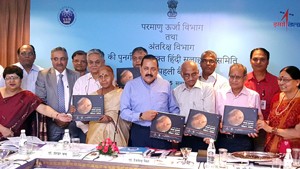Excelsior Correspondent

NEW DELHI, Oct 26: On the occasion of the first meeting of reconstituted “Joint Hindi Salahkar Samiti” of the Department of Space and Department of Atomic Energy, Union Minister of State (Independent Charge) Development of North Eastern Region (DoNER), MoS PMO, Personnel, Public Grievances, Pensions, Atomic Energy and Space, Dr Jitendra Singh today released the first-ever Hindi Atlas Book on “Mars Orbiter Mission (MOM) .
Speaking on the occasion, Dr. Jitendra Singh said that during the last 18 months, as a result of active impetus and encouragement from Prime Minister Narendra Modi, India’s Space Programme has registered some of the unprecedented and landmark achievements which have placed India as a frontline nation in the world. Incidentally however, he said, even though India’s achievements in Space missions are being appreciated the world over, Hindi language can serve as a medium for spreading further awareness within the country about recent Space missions, particularly the Mars Orbiter Mission (MOM) which is totally indigenous, living up to Prime Minister Modi’s “Make in India” initiative and has also, at the same time, provided useful information which is being shared by even the most advanced nations of the world.
Dr. Jitendra Singh appreciated the efforts of both the Department of Space as well as Department of Atomic Energy for not only having made Hindi as a medium of regular use for departmental work but have also come up with literature including periodicals and booklets in Hindi for popularizing various projects and programmes undertaken by them. He suggested that in future, the Hindi scholars, who are non-official members of “Hindi Salahkar Samiti”, will be more closely associated with the day to day activities of both the departments, so that use of Hindi becomes a natural style of working in these departments.
In the years to come, Dr. Jitendra Singh said, as India’s Space technology and Atomic Energy programmes attract more and more scientific researchers from other parts of the world, the use of Hindi language among the native scientists will also become a motivation for foreign scientists to pick up working Hindi for easier communication with their Indian counterparts. In addition, he said, promotion of Hindi as a medium of instruction in scientific departments like Space technology and Atomic Energy, will also provide the best of the young scientific minds in India, an opportunity to contribute their talent even if they do not possess the knowledge of English language.
Chairman ISRO A.S. Kiran Kumar, Chairman Atomic Energy Commission Shekhar Basu, senior scientists from Space & Atomic Energy and learned scholars of Hindi, among others, were present on the occasion.

